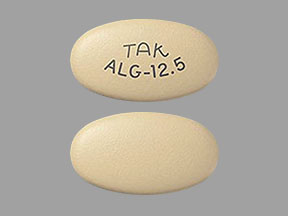Nesina Disease Interactions
There are 3 disease interactions with Nesina (alogliptin).
Alogliptin (applies to Nesina) liver disease
Moderate Potential Hazard, Moderate plausibility.
There have been postmarketing reports of hepatic failure (fatal and non-fatal) in patients taking alogliptin. Treatment should be started with caution in patients with preexisting liver disease. It is recommended to assess the liver function of the patient before starting therapy. If liver test abnormalities worsen without explanation during treatment, therapy should be discontinued and the cause of the abnormalities should be studied.
DPP-4 (applies to Nesina) renal dysfunction
Moderate Potential Hazard, High plausibility.
It is recommended to assess renal function prior to initiating treatment with DPP-4 inhibitors and periodically thereafter. Patients with moderate to severe renal insufficiency and end stage renal dysfunction will require a dose adjustment. Linagliptin will not require a dose adjustment per manufacturer's information. Additionally, there have been postmarketing reports of worsening renal function in some patients with renal insufficiency taking sitagliptin at inappropriate doses.
DPP-4 inhibitors (applies to Nesina) pancreatitis
Moderate Potential Hazard, Low plausibility.
There have been postmarketing reports of acute pancreatitis in patients taking DPP-4 inhibitors. These drugs should be used with caution in patients with a history of pancreatitis or pancreatic disease, although it is unknown if they are at increased risk. Patients should be observed for signs and symptoms of pancreatitis during treatment. If pancreatitis is suspected, treatment should be discontinued immediately and appropriate management should be initiated.
Switch to professional interaction data
Nesina drug interactions
There are 269 drug interactions with Nesina (alogliptin).
Nesina alcohol/food interactions
There is 1 alcohol/food interaction with Nesina (alogliptin).
More about Nesina (alogliptin)
- Nesina consumer information
- Check interactions
- Compare alternatives
- Pricing & coupons
- Reviews (4)
- Drug images
- Side effects
- Dosage information
- During pregnancy
- FDA approval history
- Drug class: dipeptidyl peptidase 4 inhibitors
- Breastfeeding
- En español
Related treatment guides
Drug Interaction Classification
| Highly clinically significant. Avoid combinations; the risk of the interaction outweighs the benefit. | |
| Moderately clinically significant. Usually avoid combinations; use it only under special circumstances. | |
| Minimally clinically significant. Minimize risk; assess risk and consider an alternative drug, take steps to circumvent the interaction risk and/or institute a monitoring plan. | |
| No interaction information available. |
See also:
Further information
Always consult your healthcare provider to ensure the information displayed on this page applies to your personal circumstances.


